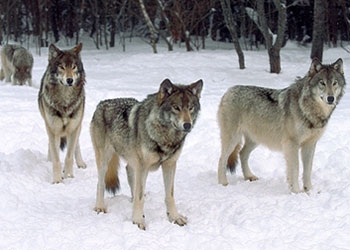 All eyes turned to the Endangered Species Act when a rider on the budget bill delisted wolves recently.
All eyes turned to the Endangered Species Act when a rider on the budget bill delisted wolves recently.
Then we learned that environmental groups are strategically swamping the Fish and Wildlife Service with petitions to list species. In response, the U.S. Fish and Wildlife Service asked Congress to cap the amount of funds spent on processing listing petitions, effectively limiting the number of species it considers.
 The large number of petitions reflects a continuing frustration on the part of some of the environmental groups with the slow pace of processing, the general approach that goes species by species. They are saying that, in light of climate change threats, habitat destruction, and the mounting extinction crisis, we need to take a whole new approach to the Endangered Species Act and focus on whole ecosystems, not just individual species. In fact, the service does have ability to list by groups as it did recently with a group of Hawaiian plants and animals.
The large number of petitions reflects a continuing frustration on the part of some of the environmental groups with the slow pace of processing, the general approach that goes species by species. They are saying that, in light of climate change threats, habitat destruction, and the mounting extinction crisis, we need to take a whole new approach to the Endangered Species Act and focus on whole ecosystems, not just individual species. In fact, the service does have ability to list by groups as it did recently with a group of Hawaiian plants and animals. I'm watching: In recent years, endangered species have been relegated to the sidelines, as big environmental groups and the business community have focused their attention on climate change resolutions. But climate change is starting to impact species. I expect to see efforts to use the Endangered Species Act as way to fight climate change, which is going to create all kinds of political and legal challenges.
Noteworthy quote: Pat Parenteau, a professor at Vermont Law School, an endangered species expert, and former general counsel to the Fish and Wildlife Service, hit the nail on the head when he said, "We're pushing species to extinction every day, and it's an overwhelming job, frankly, that the Fish and Wildlife Service has. But is the answer to put your head in the sand and say, 'We're not going to do it?'"
 It actually took an act of Congress to begin the wolf reintroduction: Congress had to delineate funds for the project after the Fish and Wildlife Service eliminated its budget. So by slipping the rider to delist wolves into the budget bill, we've really come full circle. I've heard a lot of concern about having Congress delist animals, rather than the Fish and Wildlife Service. But in this case, the delisting is following the science, according to many respected scientists involved in the reintroduction and recovery.
It actually took an act of Congress to begin the wolf reintroduction: Congress had to delineate funds for the project after the Fish and Wildlife Service eliminated its budget. So by slipping the rider to delist wolves into the budget bill, we've really come full circle. I've heard a lot of concern about having Congress delist animals, rather than the Fish and Wildlife Service. But in this case, the delisting is following the science, according to many respected scientists involved in the reintroduction and recovery.Mood on the ground: We've far surpassed initial population targets for wolf recovery: 300 wolves. We now have 1,600 wolves in three states. But in recent lawsuits, environmental groups have argued that we really need at least 5,000 wolves in a six-state area to consider them recovered. A lot of ranchers say they feel betrayed: We signed on to the recovery plan, and you keep moving the end goals on us.
I was surprised to hear ... … Ed Bangs' prediction for the future of human-wolf relations in the Intermountain West after spending 23 years working on the wolf reintroduction. He said that 30 years from now, people are going look back at these wolves and say, 'What was the big deal?' We'll just be used to living with them. I'm already seeing that with many ranchers. Their attitude has evolved. They say, wolves are here now, and we're just going to have to learn how to coexist peacefully or otherwise.
Click for additional coverage on the topic
 Conflict between human development and endangered species is going to happen. So if the rider to delist wolves leads to other riders, that could be disastrous. What I argue in my upcoming book (see link below) is that we need to look at tradeoffs: There are ecological and economic benefits to protecting endangered species, to not putting up a dam, to allowing more water to flow downstream, to having wolves in a particular area. Attaching politicians' pet projects to veto-proof bills is just not the way to argue this. There are winners and losers in any decision, but we really need to be evaluating these conflicts with science and a full account of the tradeoffs.
Conflict between human development and endangered species is going to happen. So if the rider to delist wolves leads to other riders, that could be disastrous. What I argue in my upcoming book (see link below) is that we need to look at tradeoffs: There are ecological and economic benefits to protecting endangered species, to not putting up a dam, to allowing more water to flow downstream, to having wolves in a particular area. Attaching politicians' pet projects to veto-proof bills is just not the way to argue this. There are winners and losers in any decision, but we really need to be evaluating these conflicts with science and a full account of the tradeoffs. The big picture: The Endangered Species Act has grown weaker over years of wrangling and insufficient funding. But it's still one of the strongest laws for endangered species protection on the planet. That being said, allowing it to be further diluted is going to seriously compromise the ability of the Fish and Wildlife Service to protect species, especially under the enormous threat of climate change. When the law was passed, the obvious threats were hunting and direct habitat change by people. Now we're seeing habitat changes indirectly caused by humans. And we don't know how the act is going to be able to handle that.
American as apple pie: The Endangered Species Act is often posed as anti-human, anti-development, but it really is as American as the Declaration of Independence. It was revolutionary: We were the first country in the world to put forth such an act and to defend nature's right to exist. It's as important to protect as any other American principle.
Click for additional coverage on the topic






